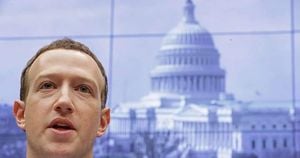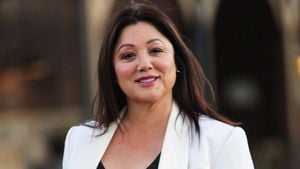Concerns surrounding the notion of free speech on college campuses have escalated following the onset of the Israel-Gaza conflict last October. A recent report has shed light on this pressing issue, highlighting how students' trust in their universities' commitments to uphold First Amendment rights is waning. Schools, particularly those performing poorly, exhibit alarming deficiencies, failing to provide clear guidelines on free expression.
The report titled "2024 Student Encampment Protests" cataloged the findings from a survey conducted from May to June by the Foundation for Individual Rights and Expression (FIRE) alongside College Pulse. This analysis included responses from 3,803 students enrolled at 30 four-year colleges and universities across the nation, with comparisons drawn from FIRE's recently published College Free Speech Rankings.
Sean Stevens, FIRE's chief research advisor, noted, "Most of the schools were not doing well before the encampments began, but their scores plummeted afterward." He attributes this decline largely to student dissatisfaction with university administrations and their apparent lack of awareness of student rights related to free speech.
The findings reveal mixed insights; 34% of students report being at least "somewhat" aware of their institution's speech policies concerning protests. Still, significant proportions remain uninformed or confused. While the majority recognize the permissibility of actions like petitions and peaceful marches, more than 10% express uncertainty or mistakenly believe such activities are prohibited. This lack of clarity extends to the boundaries of acceptable protest behaviors — with 10% to 20% unsure about regulations against disrupting university operations, like building occupations or property damage.
A noteworthy trend arising from this report is the surge of de-platforming incidents. Last year, there were 156 recorded instances, with 54 related to issues surrounding Israel or Palestine. By comparison, 110 incidents have been documented year-to-date, of which approximately 75 instances involve similar controversies. Since the conflict escalated on October 7, more than half of de-platforming efforts have directly related to these discussions.
Among the key findings, almost three-quarters of surveyed students indicated it is at least "rarely" acceptable to establish encampments during protests, with 59% endorsing building occupations under certain circumstances. Yet, the report indicated stark disparities among student experiences: over half of Muslim respondents reported feeling insecure about their freedom of speech, with 48% stating they feel "very" or "somewhat" unsafe due to police reactions to encampments across the country. Jewish students also voiced concerns, with 27% feeling their rights to free expression are vulnerable and similar percentages expressing fears related to policing tactics.
The general sentiments about free speech also diverged along ideological lines. Approximately one-third of liberal students expressed their rights to speak freely as "not at all" secure, juxtaposed against 17% of conservative respondents reporting similar sentiments. This reflects not only the current campus climate but also the polarized atmosphere surrounding discussions about the Israeli-Palestinian conflict.
Stevens elaborated on the dualities of speech protections, emphasizing, "While campus administrations retain the right to mitigate disruptive conduct, it remains their duty to establish, communicate, and enforce transparent speech policies fairly and consistently — something the underperforming schools have failed to do." He pointed out the perceived biases and inequities present within enforcement practices as contributing factors to the growing discontent among students.
Providing education on lawful protest methods forms part of FIRE's recommendations for university administrators and faculty. Suggestions include clear and consistent communication of expressive activity policies and fostering civil discourse amid differences. The report anticipates protests will likely continue to pepper the campus dynamic this fall, with the tension surrounding the Gaza conflict and the upcoming presidential election serving as significant catalysts.
While the report did not encompass Pennsylvania institutions, it did spotlight the University of Pennsylvania, which gained media attention due to the tumult and reactions stemming from extended pro-Palestine encampment protests earlier this year. On August 26, this campus enacted a temporary ban on overnight demonstrations due to the unrest these protests incited.
Both the report from FIRE and its accompanying College Pulse analysis are publicly accessible, allowing for broader examination and dialogue centered within the realms of free expression on campus.



